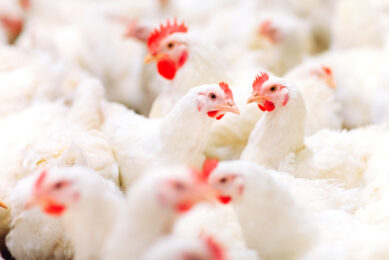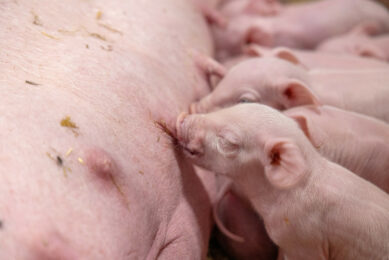Wrapping up October: What’s new in the world of pigs?

October 2017 was closed off with a bang when Cargill announced it will take over Diamond V. But it was also the month of new animal nutrition concepts introduced, new or improved feed concepts and strategies. Also, the agribusiness looked at what happened at various industry events in Brittany, France.
Cargill to acquire feed solutions company Diamond V
Animal nutrition giant Cargill is about to acquire Iowa-based feed solutions manufacturer Diamond V. Cargill, having recently invested in phytogenics company Delacon, stated that the new take-over “will give Cargill market-leading participation in the $20 billion global animal feed additives market, as well as world-class technical, regulatory and R&D capabilities and go-to-market strength in approximately 70 countries worldwide.”
Diamond V is known for immune support technologies for the livestock industry; the purchase will also encompass its human health business. Diamond V’s headquarters will remain in Cedar Rapids and the brand will be the platform for future investments in natural solutions for safer animal food production. Terms of the deal, which is expected to close in January 2018, were not disclosed.
ForFarmers: New sow feed concept
The Netherlands-based animal nutrition company ForFarmers is introducing a new feed concept for sows in North Western Europe. The range, called ‘Nova’, has been developed to feed sows and gilts throughout their reproductive cycle and focuses on good lactation and performance as well as sow longevity. The product range, which has been trialled extensively, is being launched in the Netherlands, Germany, the United Kingdom and Belgium in October-November of this year. The range is supported by a set of 6 innovations which target specific areas of the sow’s life; from gilt rearing to lactation in late parities. The diet range has been designed for a wide range of genotypes.
Norel launches Gustor L Cu
Spanish-based feed additives company Norel recently launched a new feed additive, called Gustor L Cu. The new additive is an expansion of its ‘Health and Performance Boosters’ portfolio. The product is a combination of sodium butyrate with lactic, formic and propionic acid plus copper. The new additive has proliferative properties, improves the intestinal health, it avoids inflammation and the combination of different organic acids helps bacteria and mould control and enhances the effectiveness of acidification maintaining optimum pH throughout the intestinal tract.
Berg + Schmidt optimises feed additive
German animal nutrition company Berg + Schmidt has re-formulated its phospholipid product group, called BergaPur. The re-formulation of the concentrated phospholipid complexes is based on new research results. The natural feed additive has now been designed to improve both biological performance as well as the production process in feeding strategies. The range is a high-quality, readily digestible phospholipid complex in powder form, produced by deoiling crude lecithin.
Levucell shown to improve weaner performance
Feed additive Levucell SB, a product by Lallemand Animal Nutrition, has been shown to help post-weaning pigs perform better during trials in Italy. These were presented by a team around Prof. G. Savoini from University of Milan, Italy at the 68th Annual Meeting of the European Federation of Animal Science (EAAP), in Tallinn, Estonia. The trial shows that the product, consisting of the probiotic yeast Saccharomyces cerevisiae var. boulardii CNCM I-1079 can help face post-weaning challenges, either to enhance performance when used on top of medicated feed (antibiotics and zinc oxide), or to help reduce feed medication post-weaning.
Novus, PIC: Antibiotic-free requires different guidelines
A recent study completed by Novus and PIC North America revealed that the total sulfur amino acid to lysine (TSAA:Lys) ratio may need to be adjusted to account for the immune challenges common in antibiotic-free programmes for the animal to reach its full potential. When formulating diets, nutritionists often use TSAA (methionine + cysteine) as by adequately supplementing methionine, cysteine can be synthesised endogenously in the pig, rendering unnecessary any additional cysteine supplementation.
Thus, the TSAA:Lys ratio, based on the ideal protein concept recommended by the US National Research Council in 2012 is often used as a reference in swine diets to calculate methionine supplementation levels. In a press release, the 2 companies stated: “It can be theorised that, with the removal of AGPs from diets, the immune system of piglets will be stimulated to a higher degree than seen in traditional production, which may result in changes in nutrient requirements.”
Agrifirm launches new strategy
Netherlands-based animal nutrition company Royal Agrifirm Group has launched a new strategy for a responsible food chain for future generations. Called ‘Better Together’, the strategy aims to step up the company’s focus on increasing applied knowledge and achieving synergy among all its divisions throughout the world. The company continues to strengthen its presence in selected countries with an active acquisition agenda.
SPACE 2017 attracts almost 115,000 visitors
The annual French livestock and poultry exhibition SPACE attracted 114,653 visitors this year, during its 31st edition. The show, which took place from 12-15 September at Parc-Expo Rennes exhibition centre in Rennes, France, counted 14,029 international visitors, an increase of 12% in comparison to the 2016 edition. The show counted 1,441 exhibitors, 499 of which came from overseas. In total, 47 awards were handed out for innovations at the show; four major pig innovations were awarded.
Olmix receives 800 guests in Brittany, France
Virtually coinciding with SPACE, French feed additives company Olmix welcomed over 800 guests from 43 countries for its annual Breizh Algae Tour, 10-13 between September in Britanny, France. This year’s edition of the international symposium was titled ‘A healthy food chain for a balanced microbiome, thanks to algae’. It shed light on the scientific and technical progress in research on algae and their key role in nutrition and health for plants, animals and humans. The company invests in R&D to enhance algae technology for use in diets for animals.

Brookside Agra introduces drying agent
Illinois, US-based Brookside Agra has introduced Absorb Plus, a natural, multi-purpose drying agent that provides sustained suppression and elimination of ammonia, moisture and odours in animal production and housing facilities. The product is composed of 80% hydrated sodium calcium aluminosilicate and a 20% mineral mix of iron, zinc and copper. It also contains no phosphorus, which eliminates concerns regarding manure management and application, and it poses no health threats to animals or humans.
Tecnozoo appoints Besta Biotech as Taiwanese distributor
Italy-based animal nutrition company Tecnozoo has appointed Besta Biotech to distribute their products in Taiwan. Besta is a distributor of quality products and advanced technologies for animal health. The Italian company is hoping to expand its global reach and sees significant opportunities for growth in Taiwan.
ADM opens a new premix plant in China
There are several updates this month from Illinois-based agricultural processor Archer Daniels Midland (ADM). The company opened a new feed premix plant in Zhangzhou, South China. Built with an annual production capacity of 30,000 metric tons of feed premixes and 80,000 metric tons of complete feed and concentrates, the plant is the 4th in the ADM network in China.
The company also announced it is investing in its crushing facility in Straubing, southern Germany (pictured), to produce non-GMO high-protein soybean meal.
Thirdly, the company shared new results for its yeast product CitriStim. A study by the University of Arkansas found that sows fed a diet supplemented with 0.1% of the product in gestation and lactation saw an increase in the number of live piglets born, and a reduction in the percentage of piglets that weighed less than 2 lbs (0.9 kg) at birth, and an in increase in the total number of piglets weaned per litter.

Nutriad opens new office in Poland
Belgium-based feed additives company Nutriad opened a new office in Warsaw, Poland. The company has been active in Poland for many years, and the opening of a new office is a next step, to be able to support customers.
The company also launched its portfolio on the Cambodian market. It was introduced to a group of industry professional at a seminar in the country’s capital Phnom Penh.

Topigs Norsvin sends pigs to Wens Group
Genetics company Topigs Norsvin delivered 455 Landrace animals to Wens Foodstuff Group in China. Wens will use the genetics in their production pyramid. The agreement with Wens includes regular genetic updates of the population through the import of semen from boars from nucleus farms around the world. Wens Food Group is among China’s largest pork producers.
The company also reported improvements in Feed Conversion Rate (FCR) in its Talent boars. In the past 3 years, FCR improved by almost 6%, the company said in a press release. FCR of boars tested at their farms in the Netherlands and France was 2.10 in 2013 and 1.98 in 2016. Based on a finisher with 50% Talent genes, in 3 years a reduction in feed use of 6 kg per finisher can be achieved. Daily gain also improved by 6% and is now almost 1.05 kg/day.
30% increase in breeding results
The Danish breeding system, DanAvl, will be DNA testing 100% of breeding stock compared to the 40% in the past. According to the breeding organisation, this increase will improve breeding results because the best stock can be selected with greater certainty. It is estimated that the DNA testing of all breeding candidates will deliver a 30% uplift in breeding results when compared to not testing all the candidates. A proportion of the Danish breeding herd has been DNA tested since 2010 – a process also known as genomic selection. Genomic selection can tell how close two pigs are related at DNA level, with the genealogy being used to calculate the animals’ breeding value.
Pigs’ hot-weather drinking habits revealed
Pigs don’t always drink more on hot days, they change their pattern of consumption. That is the conclusion from large-scale monitoring of commercial weaner and finishing pigs by Dr Sadie Douglas, according to a press release shared by ARM Buildings. Over 20,000 pigs of between 45kg and 110 kg live weight were monitored from July 2014 and July 2017 and it was found that, until ambient temperatures reached 30°C, temperature had a limited effect on daily water usage.

Kynetec acquires Market Probe
Berkshire, UK-based Kynetec, active in agricultural and animal health market research, has completed the acquisition of Market Probe Agriculture and Animal Health and Market Probe Europe. The acquisition brings market research expertise to the British company, adding around 40 employees to its global team of more than 600. The company will also now have operations in Belgium, increasing its global presence to 22 countries.











